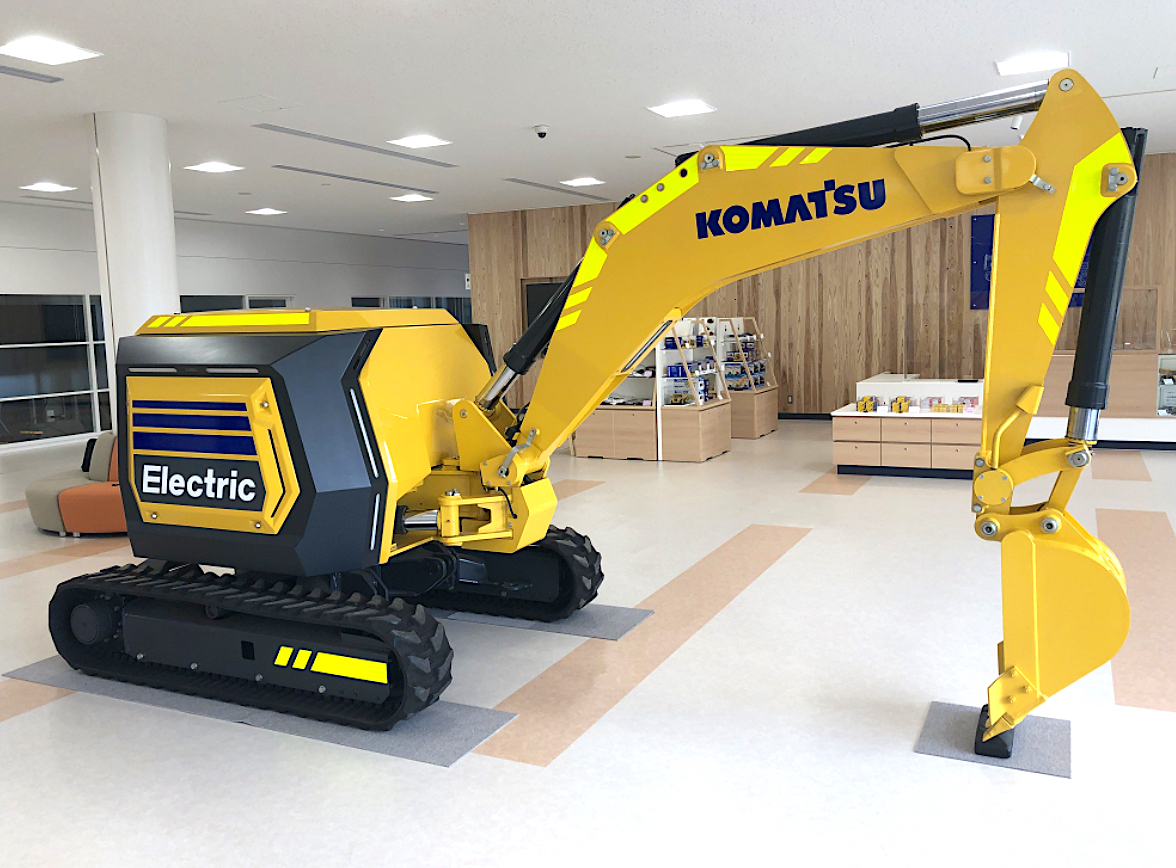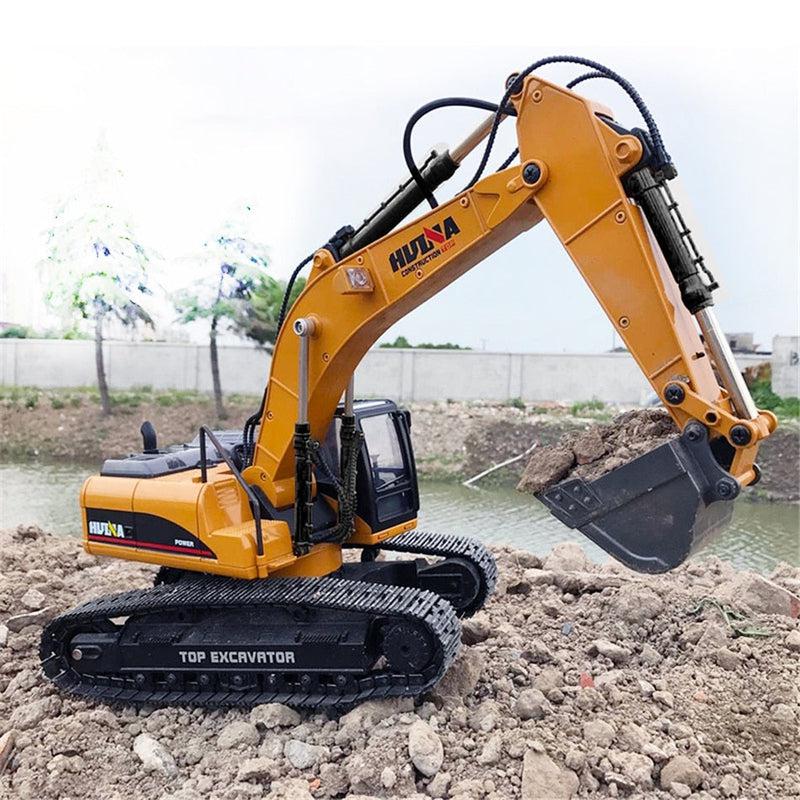Discover the Importance of Excavator in Modern Construction Projects
Excavators are essential tools in contemporary building and construction tasks. Their adaptability allows them to carry out a wide array of tasks, from excavating and grading to demolition and site prep work. Advanced functions, such as hydraulic add-ons and general practitioners, improve their capacities and effectiveness on task sites. As the market advances, the significance of excavators expands a lot more. Recognizing their role can expose insights into the future of building methods. What exists in advance for these makers?
The Versatility of Excavators in Various Projects
Although excavators are typically connected with large-scale building and construction jobs, their flexibility enables them to be made use of in a vast array of applications, from household landscape design to energy upkeep. In city setups, excavators can navigate tight areas to dig structures for homes or install drainage systems. Their capacity to execute fragile jobs makes them excellent for landscaping projects, where they can dig deep into for fish ponds or plant trees. Additionally, excavators play a crucial duty in utility upkeep, successfully excavating trenches for pipelines or cables without disrupting bordering locations. In agricultural applications, they aid in land clearing and dirt prep work. Furthermore, their flexibility allows them to be geared up with numerous accessories, boosting their functionality across various tasks. This multifaceted nature of excavators not only streamlines numerous construction processes however likewise shows their essential duty in modern infrastructure advancement and upkeep.
Trick Features and Kinds Of Excavators
The discussion on essential functions and sorts of excavators highlights the vital qualities that make these machines indispensable in building. Numerous excavator types, each designed for certain tasks, demonstrate their versatility and performance across various applications. rc excavator. Understanding these classifications and functions is essential for enhancing their usage in contemporary construction jobs
Excavator Enters Summary
Excavators play an essential role in modern building and construction, offering versatility and performance throughout numerous jobs. These heavy machinery devices been available in numerous types, each tailored for certain applications. The most typical types consist of spider excavators, known for their stability on unequal surface, and rolled excavators, which provide better mobility on smooth surface areas. Mini excavators are preferred for tight areas and small-scale projects, while long-reach excavators are designed for deep digging. In addition, there are specialized excavators, such as hydraulic excavators, which enhance power and precision. Each kind includes one-of-a-kind abilities, making them essential for tasks ranging from excavating and grading to demolition and product handling. Understanding these variants enables construction experts to pick the ideal excavator for their job requires.
Secret Features Explained
Comprehending the key functions of excavators improves their reliable application in construction projects. Excavators are characterized by their powerful hydraulic systems, which give the essential pressure for digging, lifting, and relocating materials. Their articulated arms permit a large range of activity, helping with accurate operations in restricted spaces. Additionally, the range of accessories, such as buckets, grapples, and augers, expands their flexibility to satisfy different task requirements. The dimension and weight of excavators additionally contribute to their security and maneuverability on numerous terrains. Additionally, improvements in technology have actually resulted in the integration of general practitioner and automation, enhancing accuracy and efficiency in excavation jobs. These attributes collectively position excavators as important tools in modern construction.
Applications in Construction
Transforming building and construction sites, excavators play a pivotal role throughout various applications, varying from property structure tasks to massive infrastructure developments. These functional makers are furnished for tasks such as digging foundations, trenching for energies, and site grading. Various sorts of excavators, including spider, wheeled, and mini excavators, provide particular benefits customized to the project needs. Spider excavators master harsh terrains, while wheeled excavators supply wheelchair on smooth surface areas. Mini excavators are suitable for confined rooms, making them prominent in city setups. The effectiveness and power of excavators considerably quicken building procedures, making certain prompt job conclusion. Their flexibility additionally enhances their relevance, enabling building and construction groups to deal with a varied variety of obstacles efficiently.
Enhancing Effectiveness and Productivity on Task Sites
Maximizing efficiency and efficiency on work sites is a critical goal in contemporary building and construction. Excavators play a crucial role in achieving this goal by enhancing various jobs. Their capability to do multiple features-- such as digging, grading, and training-- decreases the demand for additional equipment, thereby conserving time and resources.Moreover, excavators boost operations by enabling for faster conclusion of tasks. With advanced features like hydraulic add-ons and GPS modern technology, they can carry out precise procedures that decrease errors and revamp. This precision not just boosts the high quality of job yet likewise enhances material use, adding to cost savings.The convenience of excavators enables them to adjust to different website conditions, ensuring that projects advance smoothly despite obstacles. By incorporating excavators right into building procedures, groups can greatly improve their total performance, leading to prompt project completion and raised productivity.
Safety Advantages of Making Use Of Excavators
Excavators significantly improve security on building sites via enhanced driver presence and minimized hands-on labor threats. By offering operators with a clear sight of their environments, excavators aid to avoid accidents and injuries. Furthermore, the equipment reduces the requirement for employees to involve in unsafe manual jobs, better advertising a safer work environment.
Improved Driver Presence
Although construction sites can be disorderly and loaded with potential threats, improved operator presence plays a crucial duty in ensuring safety when utilizing excavators. Modern excavators are created with large, unobstructed windows and purposefully placed mirrors, permitting operators to preserve a clear view of their surroundings (rc excavator). This boosted exposure is essential for finding pedestrians, various other machinery, and various barriers, significantly minimizing the risk of accidents. In addition, lots of excavators include sophisticated innovation, such as electronic cameras and sensing units, to supply operators with additional perspectives, further improving understanding. The capacity to see even more clearly not just aids in efficient operation but additionally cultivates a safer job environment, making it simpler for operators to navigate intricate building websites without jeopardizing safety and security criteria
Lowered Manual Work Risks
When hands-on labor is reduced via the usage of excavators, numerous security advantages emerge, significantly improving the well-being of building and construction workers. Excavators reduce the physical pressure related to heavy training and recurring tasks, effectively reducing the danger of musculoskeletal injuries. By automating procedures such as excavating, grading, and relocating materials, they permit employees to keep a more secure distance from prospective risks. Furthermore, excavators are equipped with sophisticated security attributes, such as rollover defense systems and enhanced driver comfort designs, which additionally secure employees on site. The outcome is a significant reduction in office mishaps and injuries, bring about increased performance and spirits among construction teams. Eventually, the adoption of excavators adds to a more secure and more effective building atmosphere.
Excavators in Earthmoving and Website Preparation
In contemporary construction, a significant portion of earthmoving and site preparation tasks relies on the performance and adaptability of excavators. These machines are developed to take care of different dirt kinds and terrain, making them essential for grading, digging, and trenching tasks. Their hydraulic arms can be furnished with different accessories, such as containers and augers, permitting operators to customize their approach based on details job requirements.Excavators stand out at moving visit homepage big quantities of planet promptly and efficiently, which increases the general building and construction timeline. They can browse tight areas and challenging websites where standard equipment might have a hard time, improving productivity. Additionally, the accuracy of excavators warranties that site prep work abides by strict specs, reducing the risk of mistakes that could cause pricey rework.
The Role of Excavators in Demolition Tasks
Excavators play a vital duty in demolition tasks, as they have the power and agility required to take apart frameworks effectively. Furnished with various add-ons such as hydraulic breakers, shears, and grapples, these makers can adapt to various demolition requirements, whether for small buildings or large commercial sites. Their convenience allows operators to take on intricate jobs while keeping safety and precision.In addition to their demolition capacities, excavators facilitate debris removal, ensuring that job sites continue to be risk-free and organized. By damaging down frameworks right into manageable pieces, they enable structured clearing and recycling of materials, lining up with modern sustainability efforts.Moreover, excavators can access tight spaces and browse irregular surface, making them indispensable in city demolition jobs. Generally, their robust design and multifunctionality make excavators an essential property in the demolition stage of try this web-site building, adding substantially to job timelines and performance.


Future Patterns in Excavator Modern Technology and Use
As the building and construction industry evolves, developments in excavator innovation are positioned to transform their use and efficiency significantly. One considerable fad is the combination of automation and expert system, permitting excavators to operate with minimal human treatment. This shift will boost accuracy in jobs such as grading and trenching, decreasing human mistake and increasing productivity.Additionally, the rise of electric and hybrid excavators is forming a much more sustainable construction environment, reducing carbon emissions and gas prices. Boosted telematics systems are also arising, making it possible for real-time tracking of equipment efficiency and upkeep requirements, which can cause much better functional effectiveness and longer devices lifespan.Moreover, innovations in accessory innovation are broadening the versatility of excavators, allowing them to carry out a broader variety of tasks. The mix of these fads shows a future where excavators are smarter, greener, and extra adaptable, inevitably improving building and construction job characteristics.
Regularly Asked Inquiries
How Do Excavators Contrast to Various Other Construction Equipment?
Excavators, identified by their versatility and power, stand out in excavating and earthmoving compared to various other machinery. Their capability to execute different jobs, including training and demolition, makes them indispensable in building and construction projects, improving general efficiency.

What Is the Typical Life Expectancy of an Excavator?
The ordinary life-span of an excavator usually ranges from 7,000 to 10,000 operating hours, depending upon upkeep, usage problems, and version. Correct treatment can prolong this lifespan, making sure peak efficiency throughout its functional years.
Exactly How Are Excavators Maintained for Optimal Performance?
Excavators require normal maintenance for peak performance, including routine examinations, fluid checks, filter replacements, and timely repair services. Carrying out a precautionary upkeep routine aids lengthen their life-span and guarantees effective operation in different building settings.
What Are the Expenses Connected With Leasing vs. Getting an Excavator?
The costs connected with acquiring an excavator versus leasing vary substantially. Renting out deals reduced upfront expenses yet can collect gradually, while buying calls for a considerable initial financial investment, yet gives long-lasting savings and asset possession advantages.
What Training Is Required to Run an Excavator?
Operating an excavator needs Click This Link specialized training, generally including safety and security methods, equipment procedure techniques, and environmental recognition. Certification programs typically mandate practical experience, allowing operators to deal with different jobs effectively while making sure compliance with industry laws. The most common kinds consist of spider excavators, understood for their security on irregular terrain, and wheeled excavators, which offer greater mobility on paved surfaces. Miniature excavators are favored for limited spaces and small tasks, while long-reach excavators are made for deep excavating. In addition, there are specific excavators, such as hydraulic excavators, which improve power and accuracy. Various types of excavators, consisting of spider, wheeled, and mini excavators, provide particular benefits customized to the task requirements. Crawler excavators succeed in harsh surfaces, while rolled excavators provide movement on paved surface areas.